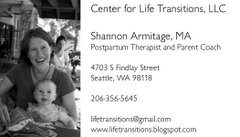I watched a documentary on PBS recently about Parkinson's Disease, entitled "My Father, My Brother, and Me". One of the researchers interviewed said of the disease, "Genetics loads the gun; environment pulls the trigger."
This metaphor seems apt for post-partum mood disorders, as two recent studies point out. Some women may be genetically predisposed to PPMDs, but they still might escape its effects if it weren't for a colicky baby, a weak support network, or other "trigger." Similarly, strengthening the environment through supportive communication with a mental health professional or other trained helper can speed healing or even innoculate against PPMDs.
I find this new research especially exciting because it means a "talking cure" for PPMDs really exists, as long parents are connected with a trusted, knowledgeable counselor.
Wednesday, February 11, 2009
Postpartum Support International of Washington Support Groups
Since I've been on my own maternity leave these past 3 months, it occurs to me that now is good time to post the newest listing of postpartum support groups in Washington (where I live). Don't live in Washington State? Check the Postpartum Support International Web site here to find a group in your neck of the woods.
Wednesday, February 4, 2009
Important Postpartum Health Study Invites New Moms and Dads to Participate
The UNLV Maternal Health Lab is conducting two surveys on postpartum
mental health. We need 500 postpartum women and their partners, who have had
children within the last year and who are 18 years and older to complete a
30-minute anonymous survey. Please go to this site and click
either the Postpartum Moms or Postpartum Dads links. Thank-you for your assistance.
mental health. We need 500 postpartum women and their partners, who have had
children within the last year and who are 18 years and older to complete a
30-minute anonymous survey. Please go to this site and click
either the Postpartum Moms or Postpartum Dads links. Thank-you for your assistance.
Subscribe to:
Posts (Atom)
